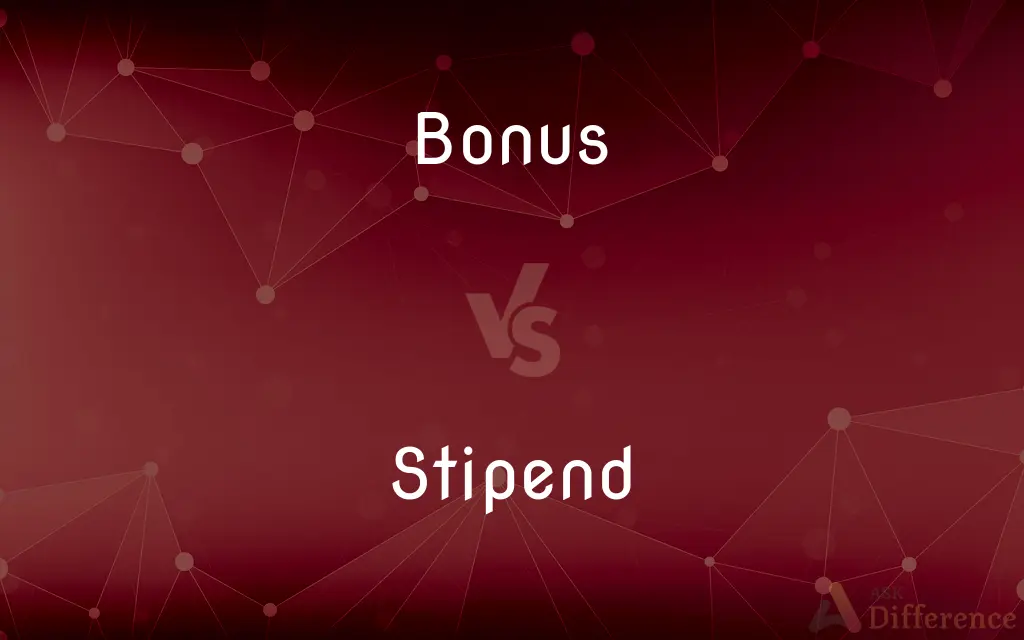Bonus vs. Stipend — What's the Difference?
By Urooj Arif & Maham Liaqat — Updated on March 20, 2024
A bonus is a financial reward given for exceptional performance or achievements, typically in a professional setting, whereas a stipend is a fixed, regular payment, often provided to interns or students for living expenses.

Difference Between Bonus and Stipend
Table of Contents
ADVERTISEMENT
Key Differences
A bonus is usually a one-time payment made to employees as a reward for exceeding performance targets or contributing to the company's profitability. It's often linked to individual, team, or company-wide achievements and serves as an incentive for maintaining high performance. On the other hand, a stipend is a predetermined amount of money that's regularly given to individuals, such as interns, students, or researchers, to help cover basic living expenses during their study, training, or research period.
Bonuses are common in various sectors, particularly in corporate environments, sales, and roles with performance-based incentives. They can significantly vary in amount, often reflecting the level of achievement or profit generated. Stipends, however, are generally modest amounts intended not to compensate for work done but to support the recipient during their educational or training endeavors, ensuring they can focus on their studies or projects without the need for part-time employment.
The criteria for receiving a bonus are usually clearly defined within an organization's performance management system, with metrics and targets set in advance. In contrast, stipends are typically awarded based on the recipient's role as a student, intern, or trainee, without the stringent performance metrics associated with bonuses.
While bonuses can be a substantial addition to one's income and significantly affect financial planning, stipends are often minimal, covering just the essentials. This reflects the different purposes of the two types of payments: one is a reward for performance, while the other is a support mechanism.
Despite their differences, both bonuses and stipends play important roles in their respective contexts. Bonuses motivate employees to strive for excellence and contribute to their financial well-being, whereas stipends enable individuals to pursue academic or professional development without the immediate pressure of earning a living.
ADVERTISEMENT
Comparison Chart
Definition
A financial reward for exceptional performance or achievements.
A fixed regular payment for support during study or training.
Purpose
To incentivize and reward high performance.
To provide financial support for living expenses.
Common Recipients
Employees in various sectors.
Students, interns, or researchers.
Payment Frequency
Usually a one-time payment.
Regular payments (e.g., monthly).
Amount
Can vary widely, often substantial.
Generally modest, covering basic expenses.
Compare with Definitions
Bonus
A bonus is an extra payment for outstanding work.
She received a bonus for surpassing her sales targets.
Stipend
Stipends are common for academic positions.
The doctoral candidate received a monthly stipend for her research.
Bonus
Bonuses can reflect company profitability.
Employees received a larger bonus this year due to increased profits.
Stipend
Stipends enable focus on training or studies.
The stipend allowed her to focus fully on her medical residency.
Bonus
Bonuses can boost employee motivation.
The prospect of a bonus motivated the sales team to exceed their goals.
Stipend
A stipend is a fixed, regular support payment.
His stipend covered his basic living expenses during the internship.
Bonus
A bonus can be a sign of appreciation.
The year-end bonus was a thank you for the team's hard work.
Stipend
Stipend amounts are usually predetermined.
The university sets the stipend levels for graduate assistants each year.
Bonus
Bonus structures vary by company.
The company's bonus scheme is linked to both individual and team performance.
Stipend
Stipends are not considered salaries.
Her stipend wasn't subject to the same taxes as a regular salary.
Bonus
Something given or paid in addition to what is usual or expected.
Stipend
A stipend is a regular fixed sum of money paid for services or to defray expenses, such as for scholarship, internship, or apprenticeship. It is often distinct from an income or a salary because it does not necessarily represent payment for work performed; instead it represents a payment that enables somebody to be exempt partly or wholly from waged or salaried employment in order to undertake a role that is normally unpaid or voluntary, or which cannot be measured in terms of a task (e.g.
Bonus
A sum of money or an equivalent given to an employee in addition to the employee's usual compensation.
Stipend
A fixed and regular payment, such as a salary for services rendered or an allowance.
Bonus
A sum of money in addition to salary that is given to a professional athlete for signing up with a team.
Stipend
(archaic) A regular fixed payment made to someone (especially a clergyman, judge, soldier, or teacher) for services provided by them; a salary. 15
Bonus
A subsidy from a government to an industry.
Stipend
(by extension)
Bonus
A sum of money paid by a government to a war veteran.
Stipend
Some other form of fixed (and generally small) payment occurring at regular intervals, such as an allowance, a pension, or (obsolete) a tax. 16
Pocket money
My stipend for doing public service is barely enough to cover living expenses.
Bonus
A premium, as of stock, that is given by a corporation to another party, such as a purchaser of its securities.
Stipend
(education) A scholarship granted to a student. 20
Bonus
A sum of money that is paid by a corporation in excess of interest or royalties charged for the granting of a privilege or a loan to that corporation.
Stipend
(obsolete)
Bonus
(Basketball) An additional free throw awarded to a player who has been fouled when the opposing team has committed more than a specified number of fouls during a period of play.
Stipend
Money which is earned; an income.
Bonus
Something extra that is good; an added benefit.
Stipend
A one-off payment for a service provided.
Bonus
An extra sum given as a premium, e.g. to an employee or to a shareholder.
The employee of the week receives a bonus for his excellent work.
Stipend
To provide (someone) with a stipend (an allowance, a pension, a salary, etc.). 16
Bonus
(video games) An addition to the player's score based on performance, e.g. for time remaining.
Stipend
Settled pay or compensation for services, whether paid daily, monthly, or annually.
Bonus
(basketball) One or more free throws awarded to a team when the opposing team has accumulated enough fouls.
Stipend
To pay by settled wages.
Bonus
(transitive) To pay a bonus, premium
Stipend
A sum of money allotted on a regular basis; usually for some specific purpose
Bonus
A premium given for a loan, or for a charter or other privilege granted to a company; as the bank paid a bonus for its charter.
Bonus
An extra dividend to the shareholders of a joint stock company, out of accumulated profits.
Bonus
Money paid in addition to a stated compensation.
Bonus
Anything that tends to arouse;
His approval was an added fillip
Bonus
An additional payment (or other remuneration) to employees as a means of increasing output
Common Curiosities
How do bonuses differ from salaries?
Bonuses are additional, often variable payments given on top of a regular salary, usually tied to performance or profits.
How are stipend amounts determined?
Stipend amounts are usually set by the sponsoring institution or organization and are often based on industry standards or living costs.
What is a bonus?
A bonus is a financial incentive given to employees for exceptional performance, achievements, or company profitability.
Can a bonus be guaranteed?
While some bonuses might be expected, they are typically not guaranteed and depend on meeting specific performance criteria or company profitability.
Are stipends only for students?
While common for students and interns, stipends can also support researchers, trainees, and others in non-profit or academic settings.
Are bonuses taxed differently than regular pay?
Bonuses are considered taxable income, but might be subject to different withholding rates or tax treatments depending on local laws.
Do bonuses affect employee motivation?
Yes, bonuses can significantly motivate employees to achieve targets and improve performance.
What is a stipend?
A stipend is a regular, fixed payment provided to support individuals like students or interns, primarily covering living expenses.
How do companies decide who gets a bonus?
Companies typically have set criteria, including individual performance, team achievements, and overall company profitability.
What impact do bonuses have on company culture?
Bonuses can positively impact company culture by recognizing and rewarding hard work, but may also lead to competition or discontent if perceived as unfair.
Are there alternatives to stipends for students?
Alternatives can include scholarships, grants, and loans, each with its own conditions and purposes.
Can stipends be increased?
Stipend increases are rare and usually depend on policy changes by the providing institution.
Is a stipend enough to live on?
Stipends are generally modest and intended to cover basic living expenses, but may not suffice for all financial needs.
Can someone receive both a bonus and a stipend?
It's possible in different contexts, such as a student with a part-time job receiving a bonus or an intern receiving a stipend and eligible for performance bonuses.
Are stipends considered employment income?
Stipends are not typically considered employment income as they're meant to support study or training, not compensate for work performed.
Share Your Discovery

Previous Comparison
Handmade vs. Handicraft
Next Comparison
Carer vs. CareerAuthor Spotlight
Written by
Urooj ArifUrooj is a skilled content writer at Ask Difference, known for her exceptional ability to simplify complex topics into engaging and informative content. With a passion for research and a flair for clear, concise writing, she consistently delivers articles that resonate with our diverse audience.
Co-written by
Maham Liaqat












































